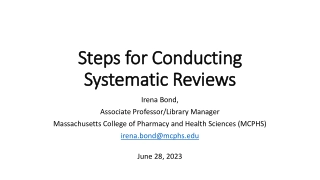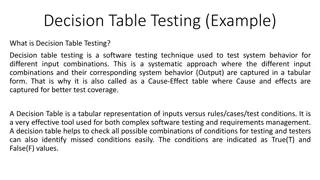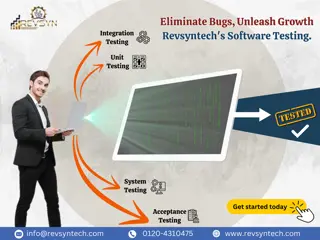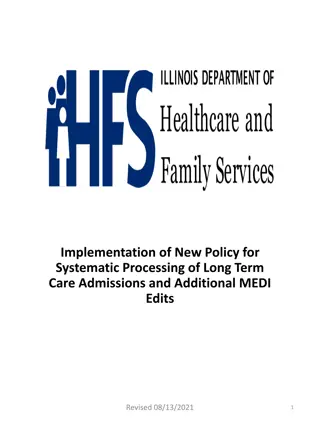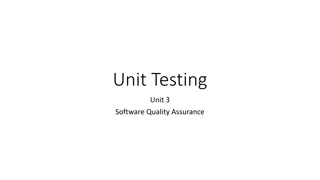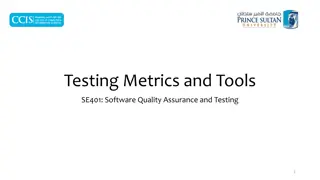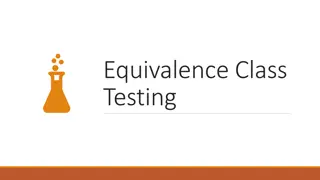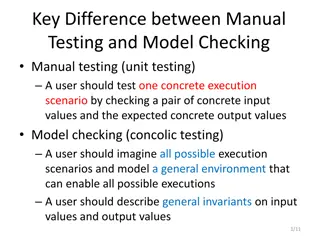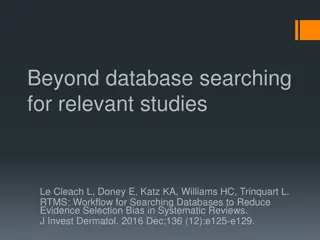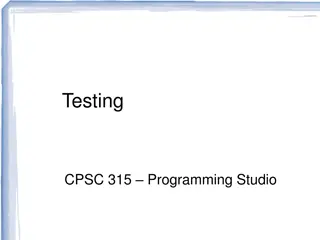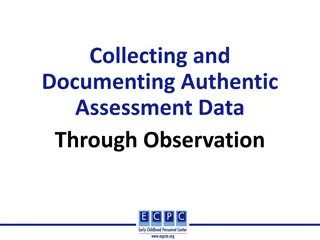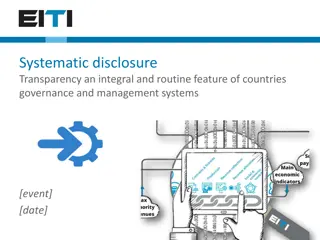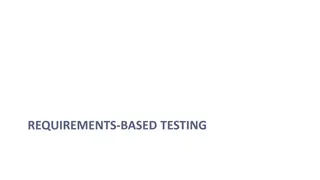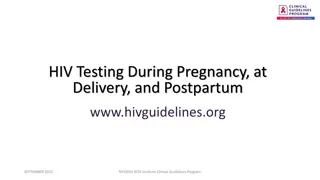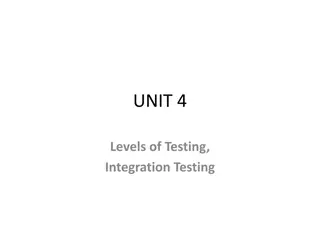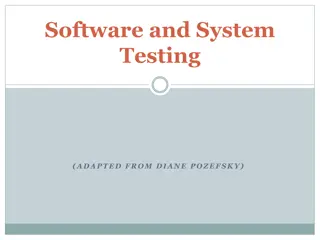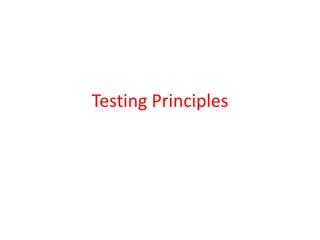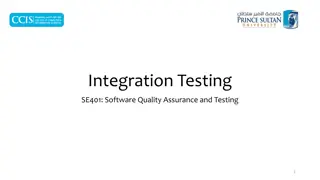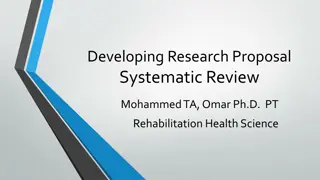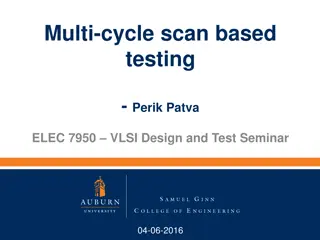Steps for Conducting Systematic Reviews
Systematic reviews are a crucial method for summarizing evidence effectively. This comprehensive guide by Irena Bond provides step-by-step instructions for beginners and junior researchers, including defining a research question, developing inclusion criteria, conducting a search, data extraction, q
5 views • 27 slides
Decision Table Testing in Software Development
Decision table testing is a systematic software testing technique that helps in testing system behavior for different input combinations. It involves capturing input combinations and corresponding outputs in tabular form to ensure thorough test coverage and identify missed conditions easily. This me
6 views • 5 slides
Eliminate Bugs, Unleash Growth Revsyntech's Software Testing.
Unit Testing\nIntegration Testing\nSystem Testing\nAcceptance Testing\nEliminate Bugs and unleash Growth of Revsyntech's Software Testing.
2 views • 1 slides
New Policy for Systematic Processing of Long Term Care Admissions
This policy outlines significant changes in the processing of long-term care admissions through MEDI, aiming to streamline the submission process, improve efficiency, and reduce delays in reimbursement. Key updates include systematic editing upon submission, eligibility criteria for systematic proce
2 views • 34 slides
Software Quality Assurance: Understanding Unit Testing and Boundary Value Testing
Unit testing is a crucial method in software development to ensure each part of the program behaves as intended. It helps detect problems early and provides a written contract for code quality. Additionally, Boundary Value Testing is a black box technique that focuses on input domain testing, with a
1 views • 49 slides
Fundamentals of Software Testing: Quiz on Testing Principles
This quiz focuses on fundamental concepts in software testing, covering topics such as test conditions, testing objectives, differences between testing and debugging, and common failure scenarios. Questions are structured to assess understanding of key principles and objectives in software testing.
2 views • 26 slides
Software Testing Metrics and Tools
Software testing metrics play a crucial role in evaluating the quality and progress of the testing process. Metrics provide valuable insights into the readiness, quality, and completeness of a product. By measuring attributes such as defects, testing efficiency, and productivity, organizations can m
4 views • 100 slides
Fundamentals of Software Testing Explained
Software testing is a critical process to ensure that software applications meet requirements and are free of defects. It involves various activities such as test planning, analysis, design, implementation, and execution. Testing approaches like the Bing bang approach and Total Quality Management ar
1 views • 48 slides
Equivalence Class Testing and Its Application in Software Testing
Equivalence class testing is a software testing technique that involves dividing input values into classes for effective testing coverage. Equivalence classes are defined mathematically as subsets of a given set, ensuring partitioning and mutual exclusivity. By applying equivalence partitioning, tes
3 views • 21 slides
Uganda's Successes in Reaching Men with HIV Testing Through Assisted Partner Notification Program
Uganda has successfully implemented an Assisted Partner Notification (APN) program to reach men for HIV testing, addressing the gender gap in testing rates. By utilizing various approaches such as index testing, self-testing, and social network testing, Uganda has achieved significant success in tar
0 views • 12 slides
Software Testing Foundation Level: Testing Throughout the SDLC Quiz
Explore key concepts in software testing throughout the Software Development Lifecycle (SDLC) with a quiz covering topics like white-box testing in acceptance testing, component testing vs. system testing, and regression testing purposes. Enhance your understanding of testing methodologies with samp
5 views • 17 slides
Importance of Software Testing in Preventing Catastrophic Failures
Software testing is crucial in ensuring the reliability and safety of software systems, as highlighted by catastrophic failures such as the Ariane 5 rocket incident and the Therac-25 radiation therapy machine disasters. These examples underscore the importance of thorough testing in identifying and
1 views • 42 slides
Testing Approach in SCREAM for E3SM Fall All-Hands 2019
Major effort is focused on verification and testing in SCREAM for the E3SM Fall All-Hands. The initiative includes unit testing, property testing, regression testing, and leveraging various tools like Cmake, Python, Jenkins, AutoTester, and GitHub for Continuous Integration (CI). The emphasis is on
1 views • 21 slides
Difference Between Manual Testing and Model Checking
Manual testing focuses on testing specific scenarios with concrete inputs and outputs, while model checking involves imagining all possible scenarios to create a general environment for testing. In manual testing, users test specific execution scenarios, whereas in model checking, users envision and
3 views • 4 slides
Implementation of LFD Testing in Workplace Settings
Introduction to LFD testing in workplaces covers foundational principles, steps to set up a testing service for employees, and roles/responsibilities of stakeholders. Employers must ensure testing is adaptable to different settings, observed/supervised, and recorded. The process involves engaging em
2 views • 7 slides
Managing Reporting Bias in Systematic Reviews - Strategies and Consequences
Reporting bias poses a significant threat to the accuracy of systematic reviews, with publication bias affecting up to 50% of trials. This bias distorts treatment effect estimates, leading to exaggerated outcomes. Strategies to mitigate reporting bias include searching bibliographical databases, exp
1 views • 17 slides
Zimbabwe HIV Viral Load Testing Overview
Zimbabwe's plan to scale up HIV viral load testing from 2018 to 2020 is outlined, with targets set for each year. The country has made significant progress in expanding its viral load testing capacity, going from targeted testing to near-universal coverage by 2018. Various testing laboratories in Zi
0 views • 9 slides
Antigen Testing in Higher Education Institutions
Antigen testing strategies are recommended for institutions of higher education, with rapid results provided by CareStart COVID-19 Antigen Tests. The testing procedure involves sample collection and interpretation of results, including criteria for validity and different outcomes. Regular testing ca
0 views • 13 slides
Evolution of Antimicrobial Susceptibility Testing in Veterinary Medicine
Antimicrobial Susceptibility Testing (AST) in veterinary medicine has transitioned from limited usage to targeted therapy with species-specific clinical breakpoints. Current challenges include low testing frequency and the need for more reliable, rapid, and cost-effective testing methods. Incentives
0 views • 32 slides
Systematic Review of Marbled Murrelet Research in Oregon State Forests
A presentation to stakeholders in Salem, OR, on October 13, 2015, highlighted the systematic review conducted by the State Forests Division on Marbled Murrelet research. The review aimed to assess the science related to key elements of the PSG protocol and other hypotheses. The Division outlined the
0 views • 59 slides
Enhancing Mobile App Testing Strategies for Quality Assurance
Innovative approaches for testing mobile apps are crucial due to the dynamic nature of the app market and increasing user expectations. This research discusses guided stochastic model-based GUI testing, challenges in testing mobile apps, a simple cookbook app for efficient recipe management, and exi
0 views • 39 slides
Software Testing and Best Practices
Explore the various aspects of software testing, including types of testing like unit, integration, regression, and system testing. Learn about the importance of writing test cases early, testing as you write code, and boundary testing to enhance software quality. Discover the significance of develo
1 views • 40 slides
Testing in Software Engineering
In the previous session, we discussed various aspects of software engineering, including modeling with UML diagrams, such as activity diagrams, use case diagrams, sequence diagrams, state diagrams, and class diagrams, as well as architecture patterns. Testing was emphasized as a key aspect, highligh
0 views • 35 slides
Gray Box Testing in Software Development
Gray Box Testing is a software testing technique that involves testing the software with partial knowledge of its internal workings. It combines aspects of White Box Testing and Black Box Testing, allowing testers to check both the presentation layer and the code part of an application. Gray Box Tes
0 views • 14 slides
Unit Testing Legacy Code: Hijacking Singletons for Testing
Enabling unit testing of legacy code requires making changes without altering existing calling code. Singleton pattern poses challenges for testing, but strategies such as hijacking can be employed for effective unit testing. David Benson shares insights on legacy code attributes and unit testing ap
0 views • 39 slides
Authentic Assessment through Systematic Observation: Best Practices
Explore the process of authentic assessment through systematic observation in early childhood education. Learn about collecting, documenting, and interpreting assessment data using evidence-based practices and technology. Discover the importance of working collaboratively with families and professio
1 views • 53 slides
Systematic Testing of Reactive Software - A Case Study on LG Electric Oven
Overview of a case study conducted on LG Electric Oven using systematic testing of reactive software with non-deterministic events. The study focused on detecting concurrency bugs in the software controller of the oven through an automated testing framework that generates event timing sequences. It
0 views • 32 slides
Importance of Systematic Screening and Assessment in Pediatric Behavioral Health
This content discusses the significance of systematic screening and assessment tools in pediatric behavioral health. It highlights the rationale for using these tools to improve access, reduce bias, ensure comprehensive assessment, enhance validity, and efficiently triage patient needs. The case stu
0 views • 8 slides
Enhancing Governance through Systematic Disclosure and Transparency
Systematic disclosure and transparency play a crucial role in the governance and management systems of countries. This involves routine disclosure of information, such as financial data, to promote accountability and address gaps in information. The EITI Standard emphasizes the importance of mainstr
0 views • 23 slides
Requirements-Based Testing in Software Development
Dive into the world of requirements-based testing in software development, exploring main concepts, test levels, testing roles, and the importance of testing your solution and modeling case. Learn about test cases, different testing activities, and the significance of acceptance testing in identifyi
0 views • 16 slides
Guidelines for HIV Testing During Pregnancy and Postpartum
These guidelines recommend HIV testing during pregnancy, at delivery, and postpartum. Testing should be done early in pregnancy and again in the third trimester. Expedited testing during labor is required for certain patients, and syphilis testing is recommended. Pre-exposure and post-exposure proph
0 views • 18 slides
Comprehensive Overview of Fault Modeling and Fault Simulation in VLSI
Explore the intricacies of fault modeling and fault simulation in VLSI design, covering topics such as testing philosophy, role of testing in VLSI, technology trends affecting testing, fault types, fault equivalence, dominance, collapsing, and simulation methods. Understand the importance of testing
0 views • 59 slides
Unit Testing in Software Engineering
Concept Software is a discipline comprising various code pieces. Testing these codes together is complex but vital in Software Engineering. The process includes early testing like unit tests, pairwise/multiple component testing, module testing, integration testing, user tests, alpha tests, beta test
1 views • 6 slides
Integration Testing and Levels of Testing
Explore the importance of integration testing in software development, covering topics such as traditional testing levels, the SATM system, goals and purposes of integration testing, testing level assumptions and objectives, software process overview, various approaches to integration testing, and t
0 views • 39 slides
Importance of Software and System Testing
Understanding the critical role of software and system testing in identifying and fixing errors before they lead to major failures. Various types of testing such as functional, usability, performance, and reliability testing are essential to ensure the quality of software products. Different classif
0 views • 52 slides
Automated Unit Testing of Large Industrial Embedded Software using Concolic Testing
Embedded software is growing in size and complexity, especially in industries like smartphone development. Manual testing is often ineffective and inefficient due to corner case bugs and test case generation challenges. To address these issues, automated unit testing utilizing Concolic Testing, a co
0 views • 33 slides
Comprehensive Overview of Software Testing and Strategies
Software testing is a crucial process that involves finding errors before delivering to the end user. The principles and objectives of testing, along with testing strategies and approaches, play a vital role in ensuring quality and reliability in software development. Various testing methods, includ
0 views • 92 slides
Integration Testing
Integration testing plays a critical role in software quality assurance by combining and testing individual software modules as a group to ensure seamless operation. This phase follows unit testing and precedes validation testing. By understanding the objectives and strategies of integration testing
0 views • 65 slides
Systematic Review in Rehabilitation Health Science
A systematic review is a comprehensive evaluation of existing research on a specific question using structured methods to select, appraise, and synthesize relevant studies. This process aids evidence-based practice, research, and policy formation in healthcare. Systematic reviews differ from narrati
0 views • 22 slides
Multi-Cycle Scan-Based Testing in Modern ICs
Modern ICs face challenges from process variations and defects, leading to the need for advanced testing techniques. This article delves into multi-cycle scan-based testing, sequential circuit testing, transistor stuck-open faults, LOC and LOS testing, and provides an example illustrating multi-cycl
0 views • 16 slides
